Farmer feature: Skulls, hides, and meat at EB Ranch
Interview with Erin Link, Owner and Farmer at EB Ranch
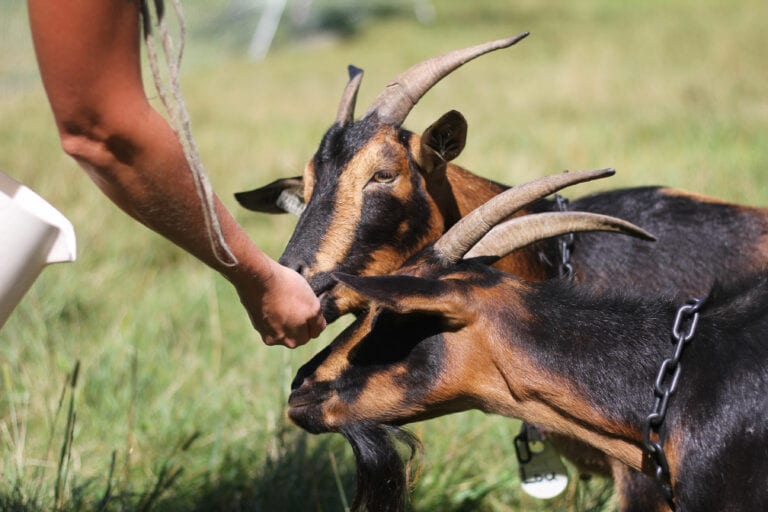
[Farm Table purchases goat milk soap crafted from Erin’s herd of critically endangered, heritage breed San Clementine Island goats. Erin also teaches soap making for us.]
What drew you to farming?
I grew up on a farm with farms and woods all around me. Farming has always been part of my life. As a teenager, I was excited to move away from my farming roots and lived in Madison and Kenosha for several years. But the pull to live in a rural environment was strong, and my partner Bob and I ended up moving back to my hometown of Ridgeland, Wisconsin, in 2009. After living in urban areas, I craved the ability to grow my own food, raise animals, learn about homesteading, and live on an acreage. And, living within just a few miles of most of my family has been an incredible support.
How do you describe your farm–what you grow or raise or market or the practices you use?
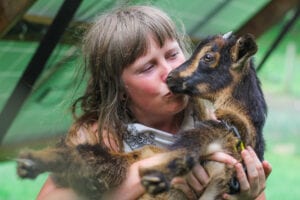 Though we have created a solid foundation over the last decade, we are still developing EB Ranch’s infrastructure and direction. One passion that has held our attention and interest since 2013 has been stewarding the critically endangered San Clemente Island Goats. Raising and promoting these goats, discovering how they fit into our lives and our farm’s purpose, has been one of my main objectives. I found out that I could promote this rare breed, as well as showcase their milk production, through soapmaking. I now use their milk exclusively to make fine goat milk soap.
Though we have created a solid foundation over the last decade, we are still developing EB Ranch’s infrastructure and direction. One passion that has held our attention and interest since 2013 has been stewarding the critically endangered San Clemente Island Goats. Raising and promoting these goats, discovering how they fit into our lives and our farm’s purpose, has been one of my main objectives. I found out that I could promote this rare breed, as well as showcase their milk production, through soapmaking. I now use their milk exclusively to make fine goat milk soap.
Three years prior to discovering these beautiful goats, I started raising pasture-raised meat chickens for myself and a few friends. Over the years, this part of our business has slowly grown. I am legally certified to process poultry on my farm and now offer a poultry share to nearly 20 families. Like any opportunity to purchase directly from a farmer, I find this helps people connect to their food and removes the cost of processing fees.
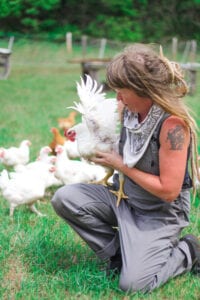 In addition to poultry, I raise turkey, guinea fowl, and duck.
In addition to poultry, I raise turkey, guinea fowl, and duck.
All the goats and poultry are on rotating pasture: I move them from small plot of pasture to small plot of pasture, allowing the forage to recover between grazings. And while I do offer limited goat meat shares, I plan to sell my goats to another local farmer (Leslie at Cylon Rolling Acres) as she has a better set up and market for pastured goats.
Visit my website to sign up for poultry shares and/or purchase goat milk soap. My goat milk soap is also sold at a number of retail spots in western WI.
How many people work on your farm?
Just Bob and me! For big projects, like bringing in hay or poultry butchering, I do ask for help from farm share members, friends, and community.
What are you thinking about these days?
I have a lot of things floating around in my brain! What first comes to mind, though, is extreme weather and climate change. This drought has me nervous about my pasture management and the future cost of hay. Thankfully, I have already purchased and stored most of my hay but may need extra if the pastures suffer from lack of rain.
 Also, thinking long-term, I wonder about how grow both my soap and pastured poultry enterprises. I am excited to have a new outlet for goat meat and will hopefully be able to offer San Clemente Island Goat breeding animals later this fall. I also hope to have a market for cleaned goat skulls again this winter as well as beautifully tanned goat hides.
Also, thinking long-term, I wonder about how grow both my soap and pastured poultry enterprises. I am excited to have a new outlet for goat meat and will hopefully be able to offer San Clemente Island Goat breeding animals later this fall. I also hope to have a market for cleaned goat skulls again this winter as well as beautifully tanned goat hides.
I am passionate about creating a transparent track for people to follow so they understand the true costs of healthy foods. For example, heritage poultry breeds cost more because the chicks are more expensive, they take longer to raise to “market weight,” and ultimately eat more grain than broiler chickens. But preserving the diversity of livestock and poultry is one of the more important ways of building resiliency into our food systems. So, I want to get more people on board, supporting heritage poultry meat shares. That in turn allows me to support and buy directly from local chicken breeders, creates a “purpose” and market for the poultry—which ends up on your plate as a wholesome and delicious meal.
What would you like eaters to know?
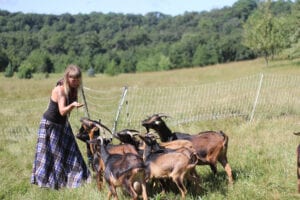 Look into supporting farmers that raise heritage breed animals. It’s always good to support your local farmer, and it’s important to learn why heritage breeds are vital to our food system’s diversity and health. Heritage breeds are those that have been selected (over centuries) for their taste, their ability to thrive in local conditions, their resiliency, and their hardiness. Sustaining these heritage breeds preserves the diversity of livestock and poultry (the same applies to heritage seed varieties). Food systems are embedded within ecosystems; those ecosystems are healthy, adaptable, and resilient to the extent that all the relationships that comprise that system are intact. When species go extinct, or genetic diversity is lost, the system itself becomes more and more tenuous.
Look into supporting farmers that raise heritage breed animals. It’s always good to support your local farmer, and it’s important to learn why heritage breeds are vital to our food system’s diversity and health. Heritage breeds are those that have been selected (over centuries) for their taste, their ability to thrive in local conditions, their resiliency, and their hardiness. Sustaining these heritage breeds preserves the diversity of livestock and poultry (the same applies to heritage seed varieties). Food systems are embedded within ecosystems; those ecosystems are healthy, adaptable, and resilient to the extent that all the relationships that comprise that system are intact. When species go extinct, or genetic diversity is lost, the system itself becomes more and more tenuous.
As you think about farming, both your own farm and the broader world of agriculture, are there policies you’d like to see enacted that would support the kind of farming you do?
I would really like to see changes in animal slaughter and processing laws. I can legally process up to 1,000 birds on my own property but need to sell those birds on the same day they are processed. I would like to be able to freeze and hold those birds and sell at a later date. I also think legalizing the on-farm killing (not necessarily processing) of ruminants should be considered. There are many weak links in our food system, and animal slaughter and processing regulations need to be examined critically.
How could readers support your work and farm?
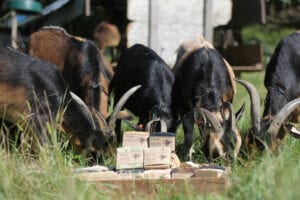 Simple things really help: follow and share about EB Ranch on social media; sign up for our weekly e-newsletter to find out about on-farm events and specials; share my work through word of mouth or social media to your own community. And, of course, you can support our farm through purchasing our products directly—and we strongly encourage supporting other local farms and businesses.
Simple things really help: follow and share about EB Ranch on social media; sign up for our weekly e-newsletter to find out about on-farm events and specials; share my work through word of mouth or social media to your own community. And, of course, you can support our farm through purchasing our products directly—and we strongly encourage supporting other local farms and businesses.
Signing up VERY early for poultry shares is a huge help. I know it’s hard to think about Thanksgiving turkey, or even June chickens, in February. But thinking ahead, signing up, and putting deposits down for poultry shares helps immensely as I develop my annual budget. Those deposits help me cover the costs of buying chicks and bulk feed.
What makes you happy as you think about your life as a farmer?
Raising food for people, and creating connections between them and their food, is so delightful. Personally, I crave varied, physical work. So, I enjoy keeping up with outside projects, brainstorming new opportunities, and simply doing daily chores. Farming keeps me on my toes and challenges me in many satisfying ways. Working for myself gives me an immense sense of contentment and is also empowering.
What makes you sad, or disappoints you, as you think about your life as a farmer?
While this is not entirely related to farming, seeing communities, friends, and family break apart and crumble is devastating. We are all connected by a few essential “things” we need in our lives. Good, wholesome food is one of those. I would like to see food and farming help build bridges and mend broken communities over time. Seeing the long-term damage done by people who seem to not want to try and work together and iron out differences is so sad and disappointing. We need to be thinking about how our decisions would better help a community grow and cooperate, rather than focusing on being “right.”
Anything else you’d like to say?
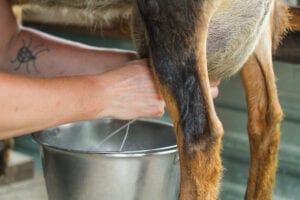 Slowly but surely, I’m trying to build more of a community around EB Ranch. I am very transparent in my practices and am well aware that others have different perspectives on how to farm. I am always receptive and welcome constructive criticism from my farm members—who sometimes point out issues I have overlooked or suggest elegant solutions to problems that have me stuck. I do hope to one day form more of a “core group” of members to help with decision making at EB Ranch. Getting other opinions and perspectives is invaluable to me as a farmer.
Slowly but surely, I’m trying to build more of a community around EB Ranch. I am very transparent in my practices and am well aware that others have different perspectives on how to farm. I am always receptive and welcome constructive criticism from my farm members—who sometimes point out issues I have overlooked or suggest elegant solutions to problems that have me stuck. I do hope to one day form more of a “core group” of members to help with decision making at EB Ranch. Getting other opinions and perspectives is invaluable to me as a farmer.
Erin Link is a steward of a herd of the critically endangered and rare San Clemente Island (SCI) goats. There are only about 1,000 of these beautiful multipurpose goats remaining; Erin feels fortunate to have a small herd of 20-50 or so purebred SCI goats on EB Ranch in Ridgeland, WI. She makes luscious goat milk soap. Each bar helps promote these rare goats and educates customers about the livestock conservancy and endangered livestock breeds.
Thank you to Brittany Olson from Photography by Berglane for the photos in this piece!
